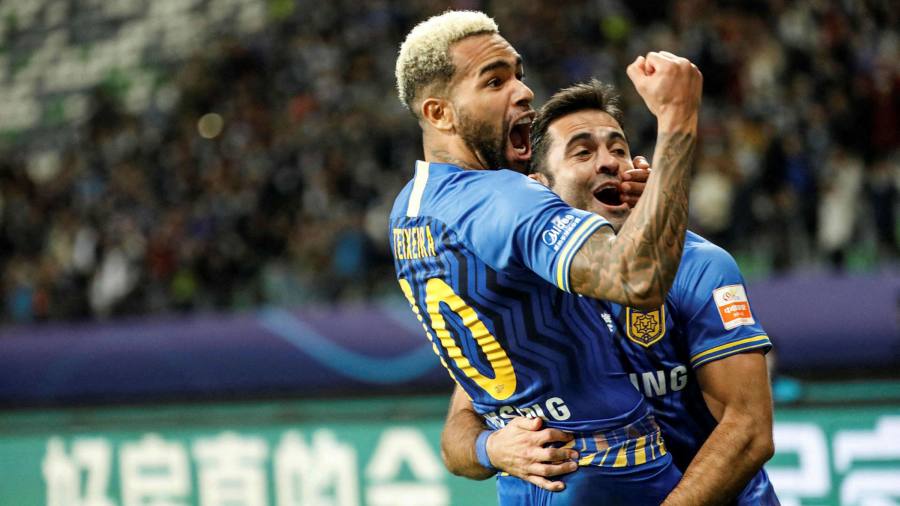[ad_1]
When Zhang Jindong linked arms with fellow billionaire Hui Ka Yan and downed a glass of baijiu in 2017, the king of Chinese retail had much to celebrate.
His Suning group had over the previous year bought Inter Milan, the prestigious Italian football club, for €270m. His streaming service, PPTV, had clinched a $700m deal to beam the English Premier League into the homes of the world’s most populous country. And back in China, he had picked up local team Jiangsu FC, deepening investment in the country’s fledgling professional league.
The acquisitions placed Zhang at the heart of Xi Jinping’s ambitions to use football — a sport the president loves — as a means to not only animate Chinese youth but to extend the country’s influence abroad.
But four years later and debt problems embroiling Zhang’s expansive conglomerate have rippled far beyond his Suning stores and websites. The unravelling of his football empire signals a starker pivot in Beijing’s approach to soft power at home and overseas: away from reliance on hitherto high-flying tycoons and corporations like Suning and back towards the guiding hand of state control.
Jonathan Sullivan, a China politics expert at the UK’s University of Nottingham, stressed that many of the central pillars underpinning Xi’s “football dream†remained unchanged.
These span scores of Chinese-built stadiums in the developing world, marketing deals boosting Chinese brands’ global exposure, cementing the country’s presence in the sport’s governing bodies and rearing a generation of footballers skilled enough to compete on the global stage.
“All of these things are long-term projects that continue. What has changed is the place of private investment in football,†Sullivan said.
In an early signal that Zhang’s strained coffers would have ramifications for his sports interests, PPTV in September lost its English football broadcast rights. This year, as a dispute related to the broadcast deal spills into the UK courts, Suning has sought $200m in emergency cash and new partners to help shore up the finances of Inter Milan.
With towering debt obligations, Zhang’s potential departure from European football would mark the latest in a string of similar exits since Beijing tightened capital controls in recent years following a torrent of outbound investment. The list includes Spain’s Atlético Madrid, Aston Villa in the UK and Slavia Prague in the Czech Republic.
Suning’s debt problems have also struck much closer to home. Jiangsu FC on February 28 ceased operations, a huge blow for fans and players just months after it won China’s top football competition, further denting the league championed by the president.
The Chinese Football Association shed little light on the development in a public notice but the club’s supporters were less opaque: “Simply put, Suning doesn’t have any more money,†one fan wrote on social media.

Zhang, 57, founded Suning in Nanjing, eastern China, in 1990 as a home appliance retailer. It expanded rapidly, filling up the homes of China’s growing consumer class with air conditioners, washing machines and televisions.
But, like many businesses once dominant on the high street, Suning has struggled to swivel to ecommerce, losing out to Alibaba, JD and Pinduoduo. On the same day as Jiangsu FC’s abrupt closure, Suning confirmed a state-backed investment in its online retail unit, Suning.com. The bailout led to Zhang and other big shareholders selling close to a quarter of their stake in the business for $2.3bn.
Suning declined to comment. Zhang has vowed to refocus on the core retail business, including growing its ecommerce unit, Yunwang Wandian.
Zhang’s cash crunch, however, appears to have intensified as a result of being intertwined with Hui’s Evergrande, the world’s most heavily indebted property developer.
In 2017 — the same year Zhang was photographed drinking with Hui, then China’s richest man — Suning ploughed Rmb20bn ($3.1bn) into Evergrande’s mainland subsidiary. Last year a stock market listing of the unit did not go to plan, meaning Suning was denied both the benefits of the IPO proceeds and its original cash investment.
Suning’s retreat also coincided with the Chinese Communist party taking greater control over private enterprise.
Simon Chadwick, an expert in the global business of football at Emlyon Business School, said the exodus of Chinese club ownership reflected a change in Beijing, which no longer wanted businesses or entrepreneurs spearheading its football diplomacy.
“What is very clear about China is that there is always a very strong link between the interests of the state, the direction of government, and what these corporations are doing,†Chadwick said. Suning “is not a corporation that has whimsically bought into Italian football, nor [did it do so] for purely commercial reasonsâ€.
Instead, analysts expect Beijing to prioritise exerting influence on governments, especially in the countries where it has built critical infrastructure, and at Fifa, the sport’s struggling governing body. This pressure is viewed as part of China’s strategy to stage the World Cup in 2030, the tournament’s centennial year.
While the hit to private capital in football threatens to temper Xi’s ambitions in the sport, Sullivan was sceptical that the Chinese leader would suffer any fallout.
“Xi’s power is sufficiently entrenched that it would take a lot more than this to damage him,†Sullivan said. “It is damaging to the football reform programme that he encouraged, but it is not hard to shift the blame . . . on to private companies and/or Covid.â€
Given booming investment into China, foreign cash might soon reach Chinese football clubs, Chadwick added.
“What China is doing right now is cultivating the conditions in football to draw in investment from overseas,†he said. “We could see Jiangsu resurrected with Volkswagen as the shirt sponsor or a US private equity business as the owner.â€
Additional reporting by Sherry Fei Ju in Beijing
[ad_2]
Source link






